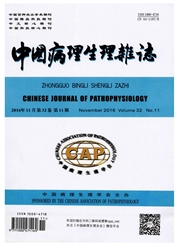

 中文摘要:
中文摘要:
目的:探讨微波消融后瘤内注射未成熟树突状细胞(iDC)能否诱导肿瘤特异性细胞毒性T淋巴细胞(CTL)。方法:建立C57BL/6J小鼠Hepal-6皮下肝癌模型,采用假消融、(45±2)℃、(50±2)℃、(55±2)℃和(60±2)℃消融肿瘤后,瘤内注射iDC,分离小鼠脾淋巴细胞,乳酸脱氢酶释放法检测致敏CTL对Hepal-6和B16淋巴瘤细胞的杀伤活性以及酶联免疫斑点测定方法监测致敏脾淋巴细胞分泌IFN-γ和IL-4的水平。结果:与假消融、(45±2)℃以及(60±2)℃消融辅以瘤内注射iDC相比,以及与单纯同样温度消融或单纯瘤内注射iDC相比,(50±2)℃和(55±2)℃消融后72h瘤内注射iDC,其致敏脾淋巴细胞对Hepal-6的杀伤率明显升高(P〈0.05),分泌IFN-γ的水平增加(P〈0.05),而(50±2)℃消融后72h瘤内注射iDC,其致敏脾淋巴细胞分泌IL-4的水平低下(P〈0.05);(50±2)℃以及(55±2)℃消融瘤内注射iDC后,CTL对Hepal-6的杀伤活性高于对B16细胞的杀伤活性(P〈0.05)。结论:50℃-55℃消融后瘤内注射iDC,能充分利用消融后瘤组织的抗原性增强,增加TAA被识别摄取以及呈递给效应细胞的量,诱导机体产生肿瘤特异性的细胞免疫应答。
 英文摘要:
英文摘要:
AIM: To investigate whether the injection of immature dendritic cell (iDC) after ablation induce and upregulate tumor specific cytotoxic T lymphocytes (CTL). METHODS: The model of hepatoma was established and the tumors were ablated with microwave under (45 ± 2) ℃, (50 ± 2) ℃, (55 ± 2) ℃, (60 ± 2) ℃ and void ablation, after which the bone marrow derived iDC was injected intratumorally. The activity of CTL was detected, and the levels of IFN - γand IL - 4 secreted by activated spleic lymphocytes were measured. RESULTS : Compared with iDC injection intratumorally after the ablation of (45 ± 2) ℃, (55 ± 2) ℃, (60 ± 2) ℃ and void ablation, the cytotoxic effect of CTL towards Hepa 1 - 6 was heightened by injecting iDC intratumorally 72 hours after ablation of (50 ± 2 ) ℃ ( P 〈 0. 05 ) so was the secretion of IFN - T ( P 〈 0. 05 ). The level of IL - 4 decreased after ablation of (50 ±2) ℃ subsequently with injecting iDC intratumorally (P 〈0. 05). The cytotoxic effect of CTL towards Hepa 1-6 was higher than that towards B16 lymphadonoma cell after iDC injection intratumorally and ablation of (50±2) ℃ and (55 ±2) ℃ (P 〈0.05). CONCLUSION: Thermal ablation of (50 -55) ℃ and subsequent injection of iDC intratumorally may induce tumor specific CTL by the way of promoting the antigenicity of ablated tumor tissue and augmenting the presentation of TAA to effector cells.
 同期刊论文项目
同期刊论文项目
 同项目期刊论文
同项目期刊论文
 期刊信息
期刊信息
